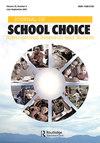Abused Homeschooled Children Deserve Legal Protections: A Response to Ray and Shakeel (2022)
Q2 Social Sciences
引用次数: 1
Abstract
ABSTRACT In this short response, we at the Coalition for Responsible Home Education (CRHE) offer two critiques of Ray and Shakeel’s (2022) recent study on the influence of demographic factors on homeschool safety. We argue that, while the study’s methodology is novel and valuable, concerns remain about its usage of snowball sampling to overrepresent certain demographics, as well as shortcomings in the survey instrument and its validation. Our main critique, however, questions the study’s ideological roots. We argue that Ray and Shakeel’s aim is to circumvent consideration of potential changes to policy measures that would protect homeschooled children. In CRHE’s view, closing loopholes that enable abuse to occur unnoticed takes precedence over determining incidence of abuse relative to school type. Indeed, we caution against conflating the relative incidence of abuse within homeschooling communities with its absolute importance to a society that prioritizes child safety.受虐待的在家上学儿童值得法律保护:对Ray和Shakel的回应(2022)
在这篇简短的回应中,我们负责任家庭教育联盟(CRHE)对Ray和Shakeel(2022)最近关于人口因素对家庭学校安全影响的研究提出了两项批评。我们认为,虽然这项研究的方法新颖而有价值,但人们仍然担心它使用雪球抽样来过度代表某些人口统计数据,以及调查工具及其验证的缺点。然而,我们的主要批评是质疑这项研究的意识形态根源。我们认为,Ray和Shakeel的目的是避免考虑保护在家上学儿童的政策措施的潜在变化。在CRHE看来,堵住使虐待行为不被注意的漏洞比确定与学校类型相关的虐待发生率更重要。事实上,我们警告不要将在家上学社区的相对虐待发生率与它对优先考虑儿童安全的社会的绝对重要性混为一谈。
本文章由计算机程序翻译,如有差异,请以英文原文为准。
求助全文
约1分钟内获得全文
求助全文

 求助内容:
求助内容: 应助结果提醒方式:
应助结果提醒方式:


